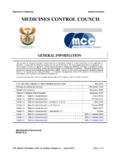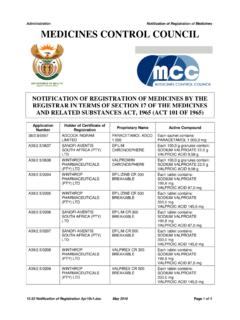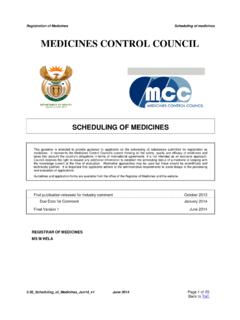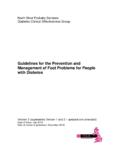Transcription of MEDICINES CONTROL COUNCIL - mccza.com
1 Registration of MEDICINES Scheduling authorised prescribers Apr 2014 Page 1 of 7 MEDICINES CONTROL COUNCIL SCHEDULING OF SUBSTANCES FOR PRESCRIBING BY AUTHORISED PRESCRIBERS This document provides guidance on the process for amending the Schedules to the MEDICINES and Related Substances Act, 1965 (Act 101 of 1965) to allow prescription rights to authorised health professionals, other than medical practitioners or dentists, in accordance with the provisions of section 22A of the Act. Version 1 - First publication released for comment October 2013 Due date for comment 31 January 2014 Final Version March 2014 Implementation Date April 2014 MS M HELA REGISTRAR OF MEDICINES Registration of MEDICINES Scheduling authorised prescribers Apr 2014 Page 2 of 7 Back to ToC TABLE OF CONTENTS Page 1 Introduction 3 Scope of the Guideline 3 2 Statutory Context 3 3 Policies for evaluating proposed changes to the Schedules 6 4 Policies_for_evaluation of applications in terms of Section 22A(15)
2 7 5 Update History 7 Registration of MEDICINES Scheduling authorised prescribers Apr 2014 Page 3 of 7 Back to ToC 1 Introduction Scope of the Guideline This document is intended to provide applicants with information and guidance on the criteria and policies applied by the MEDICINES CONTROL COUNCIL when evaluating applications for amendments to the Schedules with the objective of specifying substances to be made available for prescription by designated categories of health professionals, other than medical practitioners or dentists, as provided for by section 22A of the MEDICINES and Related Substances Act, 1965 (Act 101 of 1965). This Guideline represents input by the MEDICINES CONTROL COUNCIL in to the development of a policy framework by the Director-General of Health for the evaluation of requests and applications within the statutory framework in terms of section 22A(15) of the MEDICINES and Related Substances Act, 1965 (Act 101 of 1965).
3 However, the designation of MEDICINES to be listed for the purposes of prescribing by practitioners registered with the Allied Health Practitioners COUNCIL of South Africa is outside of the scope of this guideline. 2 Statutory Context Amongst the proposals advanced in the National Drug Policy (1996) was the stated intention to facilitate broader access to prescription MEDICINES by the establishment of a wider range of competent prescribers, thereby advancing access and improving efficiency. One of the basic health care objectives of the National Drug Policy was to ensure good dispensing and prescribing practices . However, the document continues, [the prescribing] of drugs above schedule 2 by pharmacists, except as provided for in the regulations of the MEDICINES and Related Substances CONTROL Act (101 of 1965), will not be permitted.
4 Similarly, prescribing by nurses will only be permitted in accordance with the provisions of Act 101 of 1965. While the broad-based authorisation of prescribing rights for pharmacists was not signalled, the policy document did indicate a preference for the adoption of competency-based measures as criteria for access to expanded prescribing privileges: At primary level prescribing will be competency, not occupation, based . Broadly, the development envisaged in the National Drug Policy (1996) and structurally enabled in the MEDICINES and Related Substances Act, 1965 (Act 101 of 1965) is consistent with the World Health Organization s promotion of task-shifting as a means to advancing access to MEDICINES and improving efficiency in health systems (refer World Health Organization. Task shifting: global recommendations and guidelines.)
5 2008 - ) Similar principles were outlined in the United Kingdom Department of Health report Review of Prescribing, Supply & Administration of MEDICINES . Final Report, March 1999. ( @ The legal basis for the inclusion of MEDICINES or substances in the Schedules specifically for prescribing by authorised prescribers other than medical practitioners, dentists or veterinarians is provided for in section 22A of the MEDICINES and Related Substances Act, 1965 (Act 101 of 1965). Sub-section 4 provides that: Registration of MEDICINES Scheduling authorised prescribers Apr 2014 Page 4 of 7 Back to ToC Section 22A of the MEDICINES and Related Substances Act, 1965 (Act 101 of 1965) (4) Any Schedule 1 substance shall not be sold- (a) by any person other than- (i) a pharmacist, or a pharmacist intern or pharmacist's assistant acting under the personal supervision of a pharmacist; (ii) a manufacturer of or wholesale dealer in pharmaceutical products for sale to any person who may lawfully possess such substance; (iii) a medical practitioner or dentist, who may- (aa) prescribe such substance; (bb) compound and dispense such substance only if he or she is the holder of a licence as contemplated in section 22C (1) (a); (iv) a veterinarian who may prescribe, compound or dispense such substance.
6 (v) a practitioner, nurse or a person registered under the Health Professions Act, 1974, other than a medical practitioner or dentist, who may- (aa) prescribe only the Scheduled substances identified in the Schedule for that purpose; (bb) compound and dispense the Scheduled substances referred to in item (aa) only if he or she is the holder of a licence contemplated in section 22C (1) (a); (b) to any person apparently under the age of 14 years except upon a prescription issued by an authorised prescriber and dispensed by a pharmacist, pharmacist intern or pharmacist's assistant or by a veterinarian or a person who is the holder of a licence as contemplated in section 22C (1) (a), or on a written order disclosing the purpose for which such substance is to be used and bears a signature known to the seller as the signature of a person known to such seller and who is apparently over the age of 14 years; (c) unless the seller, other than a manufacturer or wholesale dealer in pharmaceutical products, enters in a prescription book required to be kept in the prescribed manner, the prescribed particulars of such sale.
7 Sub-section (5) then applies the same construct to Schedule 2 to 6 substances: (5) Any Schedule 2, Schedule 3, Schedule 4, Schedule 5 or Schedule 6 substance shall not be sold by any person other than- (a) a pharmacist, pharmacist intern or a pharmacist's assistant acting under the personal supervision of a pharmacist, who may sell only Schedule 2 substances without a prescription; (b) a pharmacist or a pharmacist intern or pharmacist's assistant acting under the personal supervision of a pharmacist, upon a written prescription issued by an authorised prescriber or on the verbal instructions of an authorised prescriber who is known to such pharmacist; (c) a manufacturer of or wholesale dealer in pharmaceutical products for sale to any person who may lawfully possess such substance; Registration of MEDICINES Scheduling authorised prescribers Apr 2014 Page 5 of 7 Back to ToC (d) a medical practitioner or dentist, who may- (i) prescribe such substance; (ii) compound or dispense such substance only if he or she is the holder of a licence as contemplated in section 22C (1) (a); (e) a veterinarian who may prescribe, compound or dispense such substance; (f) a practitioner, a nurse or a person registered under the Health Professions Act, 1974, other than a medical practitioner or dentist, who may- (i) prescribe only the Scheduled substances identified in the Schedule for that purpose.
8 (ii) compound and dispense the Scheduled substances referred to in subparagraph (i) only if he or she is the holder of a licence contemplated in section 22C (1) (a): In addition, notice needs to be taken of sub-section 22A(14)(b) and sub-section 22A(17)(a), which reads as follows: (14) Notwithstanding anything to the contrary contained in this section- (b) no nurse or a person registered under the Health Professions Act, 1974, other than a medical practitioner or dentist, may prescribe a medicine or Scheduled substance unless he or she has been authorised to do so by his or her professional COUNCIL concerned. (17) For the purposes of this section- (a) authorised prescriber' means a medical practitioner, dentist, veterinarian, practitioner, nurse or other person registered under the Health Professions Act, 1974; Specifically, it should be noted that there is no mention of pharmacists in sub-sections 4(a)(v) or 5(f).
9 It is therefore not possible for a list of Scheduled substances, apart from Schedule 1 and 2 to, be identified in the Schedules for prescribing by pharmacists. The only enabling provision which can be used to authorise Primary Care Drug Therapy (PCDT) pharmacists is therefore section 22A(15). This reads as follows: (15) Notwithstanding anything to the contrary contained in this section, the Director-General may, after consultation with the Interim Pharmacy COUNCIL of South Africa as referred to in section 2 of the Pharmacy Act, 1974 (Act 53 of 1974), issue a permit to any person or organisation performing a health service, authorising such person or organisation to acquire, possess, use or supply any specified Schedule 1, Schedule 2, Schedule 3, Schedule 4 or Schedule 5 substance, and such permit shall be subject to such conditions as the Director-General may determine.
10 Taking into consideration the aforementioned, Section 22A(15) enables an exceptional circumstance, which is to be determined on a case-by-case basis. In responding to such applications, the Director-General can look to the MEDICINES CONTROL COUNCIL for advice on the matter. Such input should not in any way restrict the ability of the Director-General to make individual determinations for specific circumstances. Registration of MEDICINES Scheduling authorised prescribers Apr 2014 Page 6 of 7 Back to ToC As outlined in the National Drug Policy, expansion of prescribing rights to nurses and authorised persons, other than medical practitioners and dentists, who are registered with the Health Professions COUNCIL of South Africa, is intended to improve access and efficiency at Primary Health Care level.











